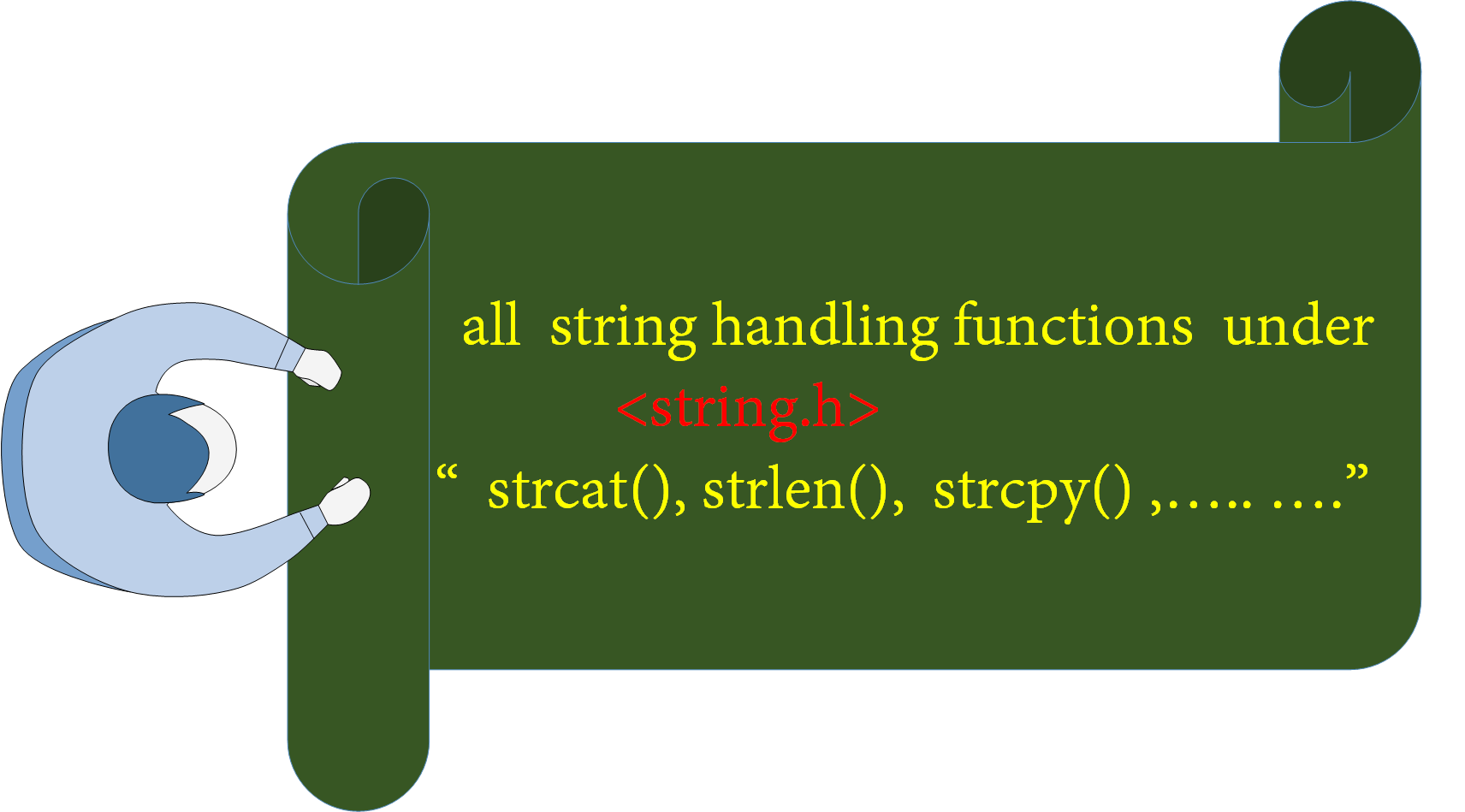After reading this string dealing functions topic, you will understand its theory and examples also you will able to use available different string functions in C programming.

In C programming various Library functions are available for handling string data and we need only to include <string.h> header file where all these string handling functions are defined. These string handling functions are:
1 strcat():- to concatenates ( or connect together) two strings. The general form is:
strcat(string1,string2);
The example below will show how strcat() function used in C programming.
#include<stdio.h>
#include<conio.h>
#include<string.h>
void main(void)
{
char string1[25]="Dennis",string2[25]="Ritchie";
strcat(string1,string2);
printf("%s",string1);
getch();
}
Output
DennisRitchie
2 strlen():- to find length of string including blank space. The general form is:
strlen(string1);
The example below will show how strlen() function used in C programming.
#include<stdio.h>
#include<conio.h>
#include<string.h>
void main(void)
{
char string1[25]="Dennis Ritchie";
printf("%d",strlen(string1));
getch();
}
Output
14
3 strcpy():- to copy one string over another. The general form is:
strcpy(string1,string2);
The example below will show how strcpy() function used in C programming.
#include<stdio.h>
#include<conio.h>
#include<string.h>
void main(void)
{
char string1[25]="Dennis";
char string2[25]="Ritchie";
strcpy(string1,string2);
printf("%s\n %s",string1,string2);
getch();
}
Output
Ritchie Ritchie
4 strcmp():- to compare two string and this function is case-sensitive. The general form is:
strcmp(string1,string2);
The example below will show how strcmp() function used in C programming.
#include<stdio.h>
#include<conio.h>
#include<string.h>
void main(void)
{
char string1[25]="DENNIS";
char string2[25]="Dennis";
if(strcmp(string1,string2)==0)
printf("strings are equal");
else
printf("strings are not equal");
getch();
}
Output
strings are not equal
5 strcmpi():- to compare two string and this function is not case-sensitive. The general form is:
strcmpi(string1,string2);
The example below will show how strcmpi() function used in C programming.
#include<stdio.h>
#include<conio.h>
#include<string.h>
void main(void)
{
char string1[25]="DENNIS";
char string2[25]="Dennis";
if(strcmpi(string1,string2)==0)
printf("strings are equal");
else
printf("strings are not equal");
getch();
}
Output
strings are equal
6 strlwr():- to convert string to lower case. The general form is:
strlwr(string1);
The example below will show how strlwr() function used in C programming.
#include<stdio.h>
#include<conio.h>
#include<string.h>
void main(void)
{
char string1[25]="DENNIS",string2[25];
strlwr(string1);
printf("Lower case :- %s",string1);
getch();
}
Output
Lower case :- dennis
7 strupr():- to convert string to upper case. The general form is:
strlupr(string1);
The example below will show how strupr() function used in C programming.
#include<stdio.h>
#include<conio.h>
#include<string.h>
void main(void)
{
char string1[25]="dennis",string2[25];
strupr(string1);
printf("Upper case :- %s",string1);
getch();
}
Output
Upper case :- DENNIS
8 strrev():- to reverse the string. The general form is:
strrev(string1);
The example below will show how strrev() function used in C programming.
#include<stdio.h>
#include<conio.h>
#include<string.h>
void main(void)
{
char string1[25]="dennis",string2[25];
strrev(string1);
printf("Reverse form :- %s",string1);
getch();
}
Output
Reverse form :- sinned